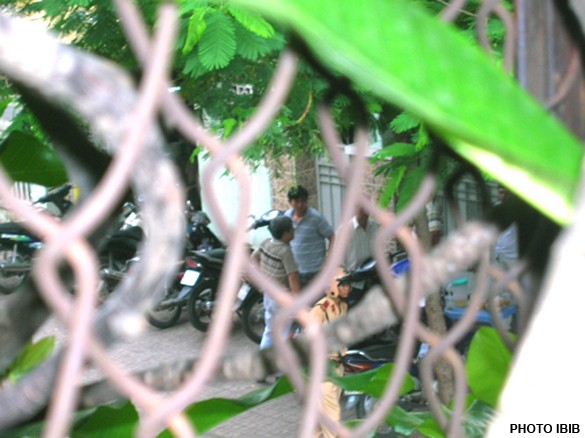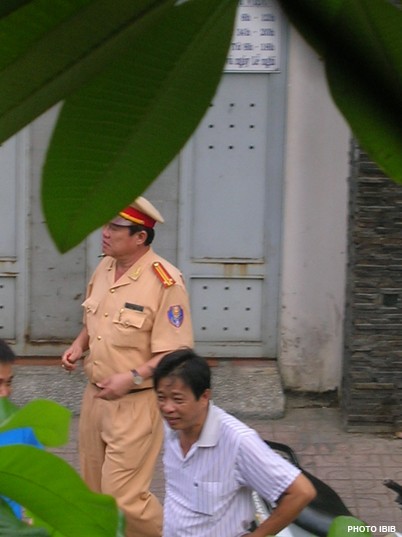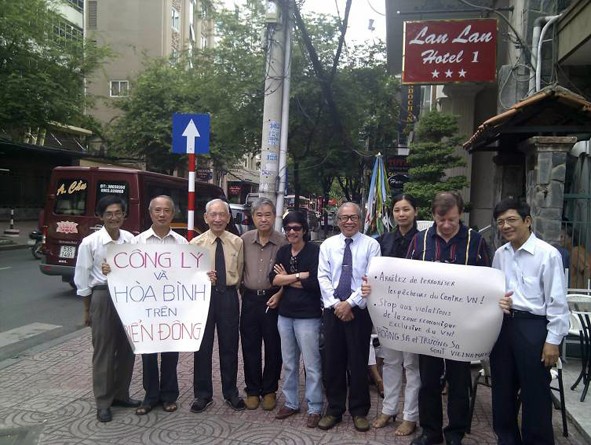PARIS, 6 June 2011 (IBIB) – The Unified Buddhist Church of Vietnam (UBCV) has informed the International Buddhist Information Bureau in Paris that Security Police in Saigon blockaded UBCV Pagodas all over Saigon from early on Sunday morning (5th June 2011) until night, and prevented Venerable Thich Quang Do and UBCV monks from responding to an appeal launched by young Vietnamese to demonstrate peacefully outside the Chinese Consulate at 39 Nguyen Thi Minh Khai Street at 8:00am on Sunday.
The demonstration was initiated by students and young people who used the Internet and cell phones to rally support for a nonviolent protest against Chinese incursion on Vietnamese territories and waters, in particular the recent attack by Chinese patrol boats on survey ships belonging to Vietnam’s National Oil and Gas Company (PetroVietnam) conducting seismic tests in waters above Vietnam’s continental shelf, approx. 120 nautical miles off the coast of Phu Yen. The Chinese patrol boats harassed the Vietnamese vessels and cut off one of the survey cables they had in tow.
 |
|
Security Police in plain clothes and uniform gather outside Thanh Minh Zen Monastery at dawn
|
 |
|
Security Police outside Thanh Minh Zen Monastery
|
Venerable Thich Quang Do planned to leave for the demonstration at 7:30am on Sunday morning, but at day-break, dozens of Security Police in uniform and plain clothes gathered outside the Thanh Minh Zen Monastery in Saigon where UBCV leader and dissident is under de facto house arrest. Several Police entered the monastery to monitor all movements. Six Security officers in uniform then ordered the monks to bring Thich Quang Do from his room on the upper floor for a “working session”. Thich Quang Do refused to meet them unless they brought a warrant.
At 7:00am, a UBCV monk came in a taxi to take Thich Quang Do to the demonstration. Security Police immediately turned it away, and prohibited Thich Quang Do and all other monks from leaving the premises. Security Police remained outside the Monastery throughout the whole day and night, and did not disperse until this morning (Monday 6th June).
UBCV Pagodas all over the city were subjected to similar blockades, and UBCV monks were systematically intercepted as they tried to leave their pagodas or take transport join the demonstration. At Giac Hoa Pagoda in Binh Thanh Ward, Venerable Thich Vien Dinh, Superior monk and UBCV Secretary-general was stopped by Police as he tried to hail a taxi along with several other monks, and escorted back to Giac Hoa Pagoda. He tried to leave again later, but was once again intercepted by Police and forced to remain inside the pagoda. Police told him: “The China sea incident is the government’s problem. The people have no right to interfere. It is against our principles, and besides, it could ruin diplomatic relations”.
Venerable Thich Quang Do told IBIB Director Vo Van Ai by phone this morning: “I am a monk, but I am also a citizen of Vietnam. When our sovereignty is violated and our lands are lost, no-one can stand idle. I am old, but I am so happy to see our young people caring so much about their homeland. They called this protest to raise public awareness of the threat of Chinese incursions encroachment. That is why I wanted to support them, as did many UBCV monks. Who could believe that Vietnam would order the Police force to suppress it’s own people’s patriotism?”
Venerable Thich Quang Do also called on Vietnamese from political and religious families to form an “Alliance against Chinese Encroachment” to press Vietnam to take stronger measures in dealing with China and to oppose China’s incursion on disputed territories, including the Paracel and Spratley islands.
 |
|
Third from left onwards: 90 year-old Nguyen Dinh Dau, former Ho Chi Minh City Fatherland Front Deputy chief Le Hieu Dang, poet Do Trung Quan, journalist Nguyen Quoc Thai, Ms Tran Tu Van Anh, Andre Menras Ho Cuong Quyet and Huynh Tan Mam
|
At least 1,000 people joined this rare public protest in Saigon, some of them travelling hundreds of miles from the central provinces. Alongside the students and young people, there were also a number of Communist Party veterans, members of the former South Vietnamese National Liberation Front (NLF) and other well-known personalities, including Huynh Tan Mam, former President of the (pre-1975) Saigon Students’ Union, Le Hieu Dang, former Deputy chief of Ho Chi Minh City’s Fatherland Front, Hanoi academic Professor Tuong Lai, poets Nguyen Duy and Do Trung Quan, blogger Osin Huy Duc, 90 year-old Catholic intellectual Nguyen Dinh Dau, and Andre Menras Ho Cuong Quyet, a Frenchman with Vietnamese citizenship who 30 years ago hung the NLF flag on the Marine’s Memorial outside the South Vietnamese National Assembly. On a placard in Vietnamese, Mr. Menras wrote: “As a French-Vietnamese citizen, I call on China to cease its aggressive and expansionist policies: Peace and Justice for the Paracel and Spratley Islands”.
One of the members of this group, Do Trung Quan described the lively exchanges between demonstrators and Police. When one security officer ordered demonstrators to disperse “in respect of the law”, Mr. Cao Lap, a revolutionary veteran who spent several years in Con Dao prison for his resistance against the French, retorted: “The law should protect Vietnam and its people, not the Chinese!” Le Hieu Dang asked the Policeman: “Whose side are you on, China’s or Vietnam’s?” At one point, the group was invited for talks in the Communist Youth’s Union HQ at No. 1 Pham Ngoc Thach Street, just across the road from the Chinese Consulate. When officials of the Communist Youth Movement called on them to cease the protests, Huynh Tan Mam replied: “We have taken a stand. If the authorities take heed of our concerns, we will support them. Otherwise we will keep on protesting”.
 Quê Me Quê Me: Action for democracy in Vietnam & Vietnam Committee on Human Rights
Quê Me Quê Me: Action for democracy in Vietnam & Vietnam Committee on Human Rights



